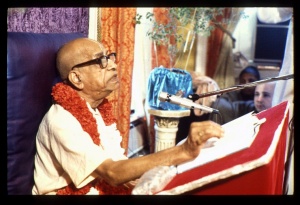SB 10.70.32: Difference between revisions
m (1 revision(s)) |
(Vanibot #0018 edit: make synonym terms in Sanskrit italic in SB - Vanisource) |
||
| Line 1: | Line 1: | ||
{{info | {{info | ||
|speaker= | |speaker=Śukadeva Gosvāmī | ||
|listener=King | |listener=King Parīkṣit | ||
}} | }} | ||
[[Category:Srimad-Bhagavatam - Canto 10 Chapter 70]] | |||
[[Category:Bhagavatam Verses Spoken by Sukadeva Gosvami - Vanisource|107032]] | |||
<div style="float:left">'''[[Srimad-Bhagavatam]] - [[SB 10|Tenth Canto]] - [[SB 10.70: Lord Krsna's Daily Activities|Chapter 70: Lord Kṛṣṇa's Daily Activities]]'''</div> | |||
<div style="float:right">[[File:Go-previous.png|link=SB 10.70.31]] '''[[SB 10.70.31]] - [[SB 10.70.33]]''' [[File:Go-next.png|link=SB 10.70.33]]</div> | |||
{{RandomImage}} | |||
{{SBnotice}} | |||
==== TEXT 32 ==== | ==== TEXT 32 ==== | ||
<div | <div class="verse"> | ||
śrī-śuka uvāca | :śrī-śuka uvāca | ||
rāja-dūte bruvaty evaṁ | :rāja-dūte bruvaty evaṁ | ||
devarṣiḥ parama-dyutiḥ | :devarṣiḥ parama-dyutiḥ | ||
bibhrat piṅga-jaṭā-bhāraṁ | :bibhrat piṅga-jaṭā-bhāraṁ | ||
prādurāsīd yathā raviḥ | :prādurāsīd yathā raviḥ | ||
</div> | </div> | ||
| Line 18: | Line 23: | ||
==== SYNONYMS ==== | ==== SYNONYMS ==== | ||
<div | <div class="synonyms"> | ||
śrī-śukaḥ | ''śrī-śukaḥ uvāca''—Śukadeva Gosvāmī said; ''rāja''—of the kings; ''dūte''—the messenger; ''bruvati''—having spoken; ''evam''—in this manner; ''deva''—of the demigods; ''ṛṣiḥ''—the sage (Nārada Muni); ''parama''—supreme; ''dyutiḥ''—whose effulgence; ''bibhrat''—wearing; ''piṅga''—yellowish; ''bhāram''—a mass; ''prādurāsīt''—appeared; ''yathā''—like; ''raviḥ''—the sun. | ||
</div> | </div> | ||
{{SBcollapse}} | |||
==== TRANSLATION ==== | ==== TRANSLATION ==== | ||
<div | <div class="translation"> | ||
Śukadeva Gosvāmī said: When the kings' messenger had thus spoken, the sage of the demigods, Nārada, suddenly appeared. Bearing a mass of golden matted locks on his head, the supremely effulgent sage entered like the brilliant sun. | Śukadeva Gosvāmī said: When the kings' messenger had thus spoken, the sage of the demigods, Nārada, suddenly appeared. Bearing a mass of golden matted locks on his head, the supremely effulgent sage entered like the brilliant sun. | ||
</div> | </div> | ||
__NOTOC__ | </div> | ||
</div> | |||
<div style="float:right">[[File:Go-previous.png|link=SB 10.70.31]] '''[[SB 10.70.31]] - [[SB 10.70.33]]''' [[File:Go-next.png|link=SB 10.70.33]]</div> | |||
__NOTOC__ | |||
__NOEDITSECTION__ | |||
Revision as of 18:28, 1 December 2017

A.C. Bhaktivedanta Swami Prabhupada
Please note: The synonyms, translation and purport of this verse were composed by disciples of Śrīla Prabhupāda
TEXT 32
- śrī-śuka uvāca
- rāja-dūte bruvaty evaṁ
- devarṣiḥ parama-dyutiḥ
- bibhrat piṅga-jaṭā-bhāraṁ
- prādurāsīd yathā raviḥ
SYNONYMS
śrī-śukaḥ uvāca—Śukadeva Gosvāmī said; rāja—of the kings; dūte—the messenger; bruvati—having spoken; evam—in this manner; deva—of the demigods; ṛṣiḥ—the sage (Nārada Muni); parama—supreme; dyutiḥ—whose effulgence; bibhrat—wearing; piṅga—yellowish; bhāram—a mass; prādurāsīt—appeared; yathā—like; raviḥ—the sun.
Translation and purport composed by disciples of Śrīla Prabhupāda
TRANSLATION
Śukadeva Gosvāmī said: When the kings' messenger had thus spoken, the sage of the demigods, Nārada, suddenly appeared. Bearing a mass of golden matted locks on his head, the supremely effulgent sage entered like the brilliant sun.